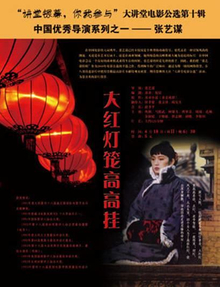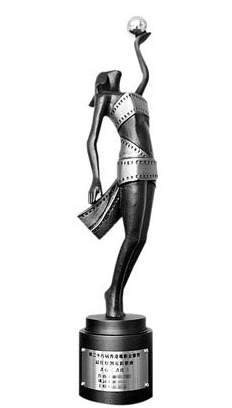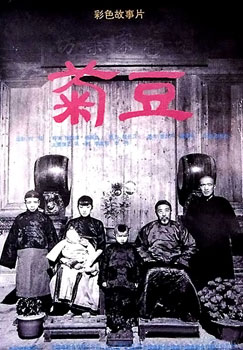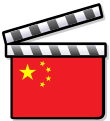
Raise the Red Lantern is a 1991 Chinese period drama film directed by Zhang Yimou and starring Gong Li. It is an adaptation by Ni Zhen of the 1990 novella Raise the Red Lantern by Su Tong. The film was later adapted into an acclaimed ballet of the same title by the National Ballet of China, also directed by Zhang. Set during the Warlord Era in the 1920s, the film tells the story of a young woman who becomes the fourth wife of a wealthy man. It was the third of eight collaborations between Zhang and Gong, following Red Sorghum in 1987 and Ju Dou in 1990. The film was shot in the Qiao Family Compound near the ancient city of Pingyao, in Shanxi Province.

Samuel "Sammo" Hung Kam-bo is a Hong Kong actor, martial artist, film producer and director, known for his work in martial arts films, Hong Kong action cinema, and as a fight choreographer for other actors such as Jackie Chan.

Gong Li is a Chinese actress. Regarded as one of the best actresses in China today, she is known for her versatility and naturalistic performance. She starred in three of the four Chinese-language films that have been nominated for the Academy Award for Best International Feature Film.
The year 1991 in film involved numerous significant events. Notable films released this year included The Silence of the Lambs, Beauty and the Beast, Thelma & Louise, JFK, Boyz n the Hood, and Terminator 2: Judgment Day.

Farewell My Concubine is a 1993 Chinese-Hong Kong epic historical drama film directed by Chen Kaige, starring Leslie Cheung, Gong Li and Zhang Fengyi. Adapted for the screen by Lu Wei, based on the novel by Lilian Lee, the film is set in the politically tumultuous 20th-century China, from the early days of the Republic of China to the aftermath of the Cultural Revolution. It chronicles the troubled relationships amongst two lifelong friends, the Peking opera actors Cheng Dieyi (Cheung) and Duan Xiaolou (Zhang), and Xiaolou's wife Juxian (Gong).

The Hong Kong Film Awards, founded in 1982, is an annual film awards ceremony in Hong Kong. The ceremonies typically take place in April, and have mostly been held at the Grand Theatre of the Hong Kong Cultural Centre since 1991. The awards recognise achievement in various aspects of filmmaking, such as directing, screenwriting, acting and cinematography. The awards are regarded as the Hong Kong equivalent of the Academy Awards.

Aaron Kwok Fu-shing is a Hong Kong singer, dancer, actor and racing driver. Active since the 1980s, Kwok is known as one of the "Four Heavenly Kings" of Hong Kong pop music. Dubbed the "God of Dance", Kwok's onstage dancing is influenced by the late American performer Michael Jackson. He has released over 30 studio albums in Cantonese and Mandarin, mostly in the dance-pop genre, with elements of rock, R&B, soul, electronica and traditional Chinese music.
Corey Yuen Kwai is a Hong Kong film director, film producer, action choreographer, and former actor.

Ju Dou is a 1990 film directed by Zhang Yimou and Yang Fengliang, starring Gong Li as the title character. The film, based on the novel Fuxi, Fuxi (伏羲伏羲) by Liu Heng, is a tragedy that revolves around Ju Dou, a beautiful young woman sold as a wife to Jinshan, an elderly cloth dyer. The film was produced using the vivid Technicolor process, long after it had been abandoned in the United States. It became the first Chinese film to be nominated for an Academy Award for Best Foreign Language Film.
This is an index for the list of films produced in mainland China ordered by decade on separate pages. For an alphabetical listing of Chinese films see Category:Chinese films

A Brighter Summer Day is a 1991 Taiwanese epic teen crime drama film directed by Edward Yang, associated with the New Taiwanese Cinema. Its English title is derived from the lyrics of Elvis Presley's 1960 rendition of "Are You Lonesome Tonight?". Set in the late 1950s and early 1960s, the film centers on Hsiao Si’r, a boy from a middle-class home who veers into juvenile delinquency.
2017 in film is an overview of events, including the highest-grossing films, award ceremonies, festivals, a list of films released, and notable deaths.
2018 in film is an overview of events, including the highest-grossing films, award ceremonies, critics' lists of the best films of 2018, festivals, a list of films released, and notable deaths.
The following lists events in the year 1991 in China.

The 35th Hong Kong Film Awards presentation ceremony took place in Hong Kong Cultural Centre on 3 April 2016. The host of the awards ceremony was Sean Lau. The state-owned China Central Television did not air the program as it had previously for every year since 1991; this was because the film nominated for best picture in the awards, Ten Years, was seen to be critical of China's influence over Hong Kong. The Chinese government was reported to have ordered the state broadcaster not to broadcast the ceremony.









